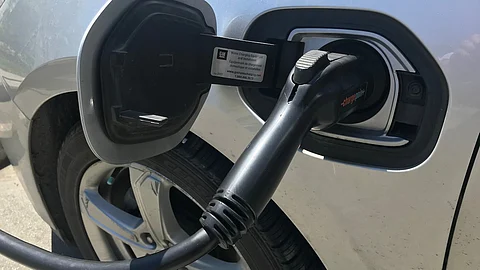

Automakers have formally urged British Columbia to repeal its electric vehicle sales mandate, arguing the targets are unrealistic.
Blacklock's Reporter says the B.C. program, the first of its kind in Canada, served as a blueprint for a federal mandate set to ban new gas and diesel car sales by 2035.
"British Columbia’s target of 90% zero-emission vehicle sales by 2030 is not achievable," manufacturers and dealers stated.
"Even under the best conditions, without significant trade disruptions from tariffs, sales would only reach 57% in 2030 — far below government-mandated targets that carry penalties of over $20,000 per unit short."
The statement was signed by Global Automakers of Canada, the Canadian Vehicle Manufacturers’ Association, and the Canadian Automobile Dealers Association.
"Sales targets were set in a time very different from the challenges we now face and will not be met," it said.
B.C.’s legislature passed the Zero Emission Vehicles Act in 2019, mandating 100% zero-emission vehicle sales for new cars by 2035. However, last year, these vehicles made up less than 21% of total new car sales in the province, despite rebates of up to $4,000.
The federal transport department ended its $5,000 rebates on January 14. At the time, automakers also criticized the federal mandate as unworkable.
"It seems highly likely the country will head into an election once Parliament returns March 24 with no guarantee that any future government will continue to spend on purchase incentives," said David Adams, CEO of Global Automakers of Canada.
A 2024 Budget Office report found that even with rebates, electric vehicles remained unaffordable for most drivers.
"We estimate the relative ownership cost of battery electric vehicles would need to decrease by 31% to meet the zero-emission vehicle sales target," said an August 29 report titled Electric Vehicle Availability Standard: Potential Impacts On Ownership Costs And Charger Supply.
In-house federal research found many Canadians viewed electric cars as impractical for long commutes or rugged terrain.
"Several expressed concerns about the ability of these vehicles to navigate remote or difficult terrain, an issue that was felt to be particularly important for Canada," said a 2022 report Continuous Qualitative Data Collection Of Canadians’ Views.
"A common worry identified by participants was the potential of running out of power while in a remote area and having no way to recharge their vehicle," the report added. The findings were based on nine focus groups in British Columbia, Ontario, and Québec.
Even if zero-emission vehicles cost the same as gas-powered cars, many drivers still wouldn’t buy them, the study found. A significant number of respondents cited concerns over battery life, range limitations, and a general preference for gasoline-powered vehicles.
